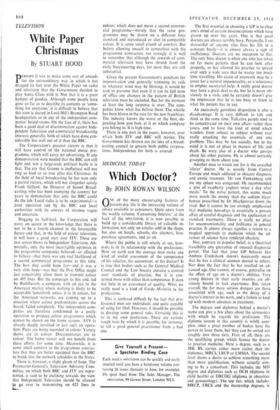White Paper Christmas
TELEVISION
By STUART HOOD
The Corporation's greatest victory is that it will have control of the national music pro- gramme, which will carry no advertising. If any demonstration were needed that the BBC can still fight and win a large-scale political battle it is that. The cry that Greene is ineffectual will not ring so loud or so true after this Christmas. In the field of local broadcasting he has won only a partial victory, which will not altogether satisfy Frank Gillard, the Director of Sound Broad- casting, who has been stumping the country for years to demonstrate that only the BBC could do the job. Local radio is to be experimental—a joint operation run by the BBC and local authorities with its sources of revenue vague and uncertain.
Hugging its half-loaf, the Corporation will carry on secure in the knowledge that there is not to be a fourth channel in the foreseeable future and that, in the field of colour television, it will have a good start over ITV. These are two severe blows to Independent Television. Ad- mittedly, only the most incorrigible optimists in the programme companies believed—or affected to believe—that there was any real likelihood of a second commercial programme at this time. The best they could hope for—and it was a very slim hope—was that the Post Office might just conceivably allow them to transmit colour on 405 lines. But the campaign to this end, led by Rediffusion, a company with an eye to the American market where nothing is likely to be acceptable henceforth unless it is in colour, for the American networks are coming up to a situation where colour predominates across the board, failed completely. The independent com- panies are therefore condemned to a costly operation to produce colour programmes which cannot be shown on the home screens. ATV is already deeply involved in just such an opera- tion. Plays are being recorded in colour. Variety shows are in colour. Documentaries are in colour. The home viewer will not benefit from these efforts for some time. Meanwhile, it is some small comfort to the programme contrac- tors that they are better equipped than the BBC to break into the network schedules in the States.
There is, however, a slight gleam of hope. The Postmaster-General's Television Advisory Com- mittee, on which both BBC and ITV are repre- sented, is said to be inclining towards the view that Independent Television should be allowed to go over to transmitting on 625 lines in colour; which does not mean a second commer- cial programme—merely that the same pro- grammes may be shown on a different lines standard and reproduced or shot in compatible colour. It is some small crumb of comfort. But before allowing oneself to sympathise with the programme contractors too strongly it is well to remember that although the rewards of com- mercial television may have shrunk from the early buccaneering days, for most they are still substantial.
Given the present Government's penchant for improvisation and generally trimming its sails to whatever wind may be blowing, it would be rash to presume that even if it ran its full term of office any changes in the pattern of British television must be excluded. But for the moment at least the long suspense is over. The com- panies know what lies before them. The whistle has been blown in the race for the new franchises. The industry knows the worst or the best, de- pending how you look at it or which company you belong to. It is high time.
There is one part in the paper, however, over which both ITV and BBC will rejoice. The Government has thrown out the idea of a broad- casting council to govern both public corpora- tions. Independence for both is assured.






























 Previous page
Previous page